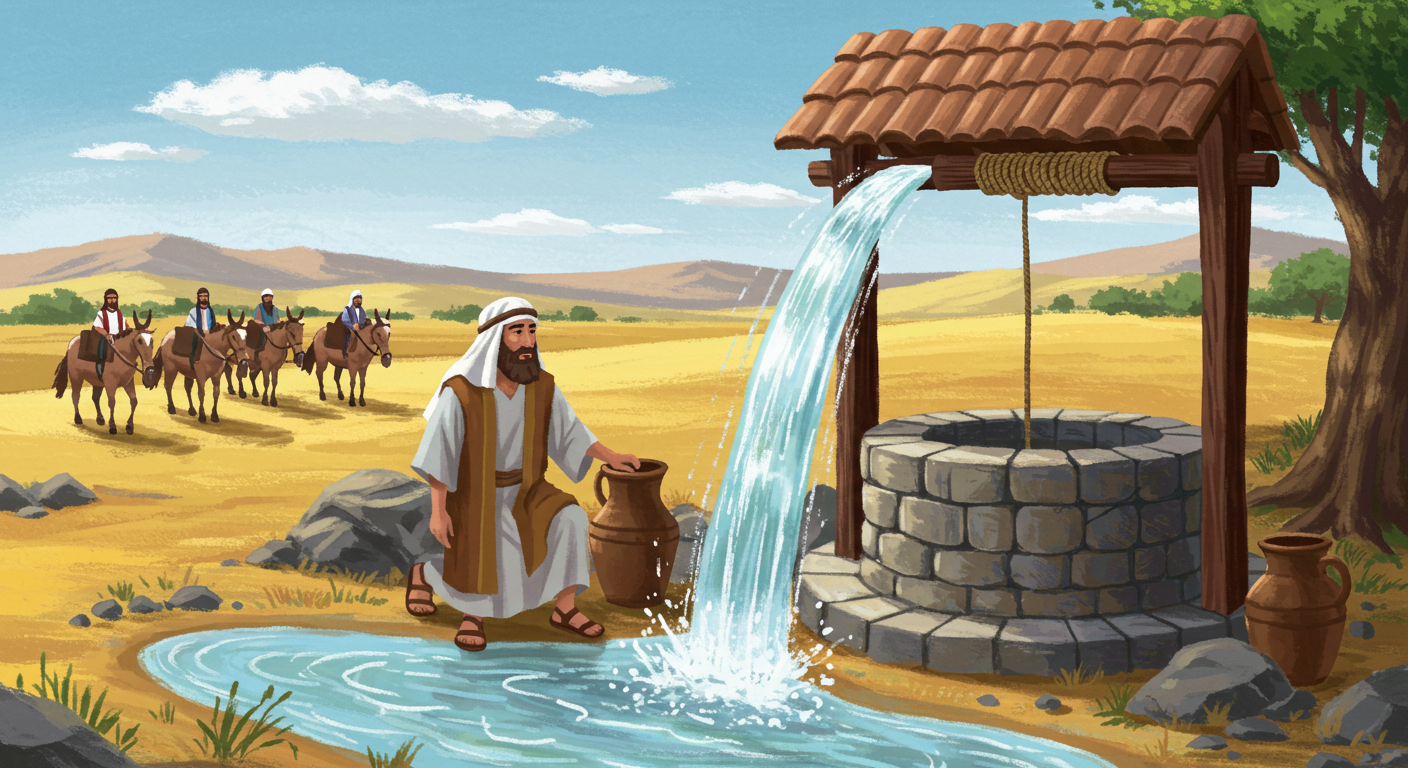Isaac And The Wells: A Story Of Peace, Persistence, And Provision
In the backdrop of arid landscapes and age-old traditions, there’s an ancient story that holds profound wisdom for the modern soul. It’s the tale of Isaac and the wells, a narrative deeply embedded in Genesis 26. While the story originates in a distant time and place, the lessons of peace, persistence, and provision resonate with today’s recurrent themes of conflict and resolution. As we journey through Isaac’s experiences, let’s unearth how these lessons apply in addressing contemporary situations of conflict or injustice.
A Day in the Life of Biblical Times
Before diving into the heart of the story, imagine the world Isaac inhabited. It’s a world far removed from ours yet strangely familiar. The terrain is rugged, marked by vast stretches of nothingness where sustenance hinged on scarce and precious resources. Water, a critical source of life, held supreme importance. In an agrarian society like Isaac’s, the control of wells, which provided this lifeline, often triggered disputes and rivalry.
Isaac inherited not only the blessings promised to his father Abraham but also the legacy of their household’s complex interactions with neighboring tribes. His story isn’t merely about digging into the earth. It’s a profound metaphor for human effort, divine provision, and the ultimate quest for peace.
The Legacy of Wells
Wells represented much more than just water; they symbolized territory, influence, and prosperity. So, when Isaac reinstates the wells his father had once dug, he wasn’t merely engaged in a physical task. In Genesis 26:18, we learn that Isaac reopened the wells which had been stopped up by the Philistines after Abraham’s death. This act signified reestablishing the family’s rightful claim and honoring the legacy left by his father.
But Isaac’s actions were not without contention. The Philistines, whose envy of Isaac’s prosperity was palpable, challenged his claims to these wells. Nonetheless, Isaac persisted, not in the form of open conflict, but with a spirit of surrender and wisdom, moving when necessary to maintain peace. This characteristic approach unfolds through a series of significant episodes.
The First Well: Esek
As Isaac’s men dig a well in the valley and find fresh water, the Philistine herdsmen lay claim to it. Isaac names the well Esek, meaning “dispute.” Here lies the first lesson of Isaac and the wells Bible meaning: conflict is inevitable. But instead of choosing confrontation, Isaac chooses to move on. In Genesis 26:20, the narrative captures this altercation succinctly.
Isaac’s choice to move on instead of escalating tension advocates not just flexibility but a mature understanding that some battles aren’t worth fighting. This is especially resonant today, where disputes can easily escalate from a simple disagreement into long-standing feuds. Isaac’s example offers a teaching on recognizing when to relinquish temporary gains for lasting peace.
The Second Well: Sitnah
Undeterred, Isaac’s servants dig another well, only to face opposition once more. This time, the well is named Sitnah, meaning “hostility” (Genesis 26:21). The story takes a familiar turn, with Isaac choosing again not to stay entangled in a cycle of conflict.
By repeatedly choosing to walk away rather than fighting for his claim, Isaac models an exceptional form of strength—one rooted in patience and wisdom. Sitnah stands as a testament to human tenacity in the face of hostility and the strength required to persist without succumbing to the provocation of others.
The Third Well: Rehoboth
Finally, Isaac’s men dig a third well. This time, there is no dispute. Isaac names it Rehoboth, saying, “Now the Lord has given us room and we will flourish in the land” (Genesis 26:22). Here is the epitome of the Isaac and the wells Bible meaning: persistence matched with divine providence yields peace.
Rehoboth symbolizes the expansive possibilities when one patiently navigates through trials without losing heart. It’s a reminder that surrender doesn’t mean defeat; it can be a strategic choice that opens up broader horizons.

The Well of Promise
As the story unfolds, God appears to Isaac, reaffirming His promises of blessings (Genesis 26:24). This divine encounter comes after Isaac’s peaceful handling of hostility. It’s a symbolic confirmation that divine provision often follows human perseverance in the face of adversity.
In times of conflict or injustice, it’s easy to lose sight of one’s values and promises of a greater good. Isaac’s patient resolve and the repeated blessings he receives underscore a profound truth—those who strive for peace and maintain integrity will find themselves aligned with divine purpose, and often, new doors of promise will open.
Applying Isaac’s Lessons Today
Isaac’s saga of peace, persistence, and divine provision isn’t an antiquated script but a timeless blueprint for today’s conflicts and inequities. His approach fosters an environment that’s conducive to progress and coexistence, much needed in our current socio-political climate marked by polarization.
Lessons of Peace
Today, like in Isaac’s time, peace is often eschewed in favor of short-term victories. Disputes abound in individual relationships, corporate boardrooms, and among nations. Imagine what might change if, like Isaac, individuals and groups chose to disengage from fruitless strife, investing in long-range peace instead.
The Power of Persistence
Isaac’s story teaches that persistence is about more than stubborn resistance; it’s about a resilient calm under pressure. This lesson can reshape how we face systemic injustices—persistently advocating for change, yet choosing paths that promote shared understanding over discord.
Trust in Divine Provision
Finally, Isaac’s faith in divine provision offers solace amidst uncertainty. It’s a comforting reminder that though the journey is fraught with challenges, provision often appears at unexpected moments. Faith, aligned with action, remains a powerful catalyst for personal and societal transformation.
Conclusion: Reflection and Action
Isaac’s journey with the wells transcends time, offering wisdom and guidance for the ages. His story reminds us of the power inherent in peace, persistence, and faith in a divine provision that supersedes our immediate surroundings.
As you ponder these ancient lessons, consider how they might reshape your approach to life’s challenges today. Whether you’re facing personal strife or advocating for justice on a larger scale, let Isaac’s legacy inspire a pathway marked by peace and resilience.
Explore More
For further reading and encouragement, check out these posts:
👉 7 Bible Verses About Faith in Hard Times
👉 Job’s Faith: What We Can Learn From His Trials
👉 How To Trust God When Everything Falls Apart
👉 Why God Allows Suffering – A Biblical Perspective
👉 Faith Over Fear: How To Stand Strong In Uncertain Seasons
👉 How To Encourage Someone Struggling With Their Faith
👉 5 Prayers for Strength When You’re Feeling Weak

📘 Jesus and the Woman Caught in Adultery – Grace and Mercy Over Judgement
A powerful retelling of John 8:1-11. This book brings to life the depth of forgiveness, mercy, and God’s unwavering love.
👉 Check it now on Amazon
As a ClickBank Affiliate, I earn from qualifying purchases.
Acknowledgment: All Bible verses referenced in this article were accessed via Bible Gateway (or Bible Hub).
“Want to explore more? Check out our latest post on Why Jesus? and discover the life-changing truth of the Gospel!”








